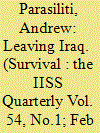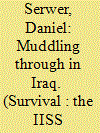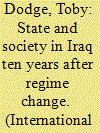|
|
|
Sort Order |
|
|
|
Items / Page
|
|
|
|
|
|
|
| Srl | Item |
| 1 |
ID:
110303


|
|
|
|
|
| Publication |
2012.
|
| Summary/Abstract |
On 19 December 2011, one week after US President Barack Obama welcomed Iraqi Prime Minister Nuri al-Maliki to the White House, and as the final US troops were leaving Iraq, an Iraqi judicial panel issued an arrest warrant for Vice President Tariq al-Hashemi, a Sunni from the rival Iraqi National Movement (also known as 'al-Iraqiyya'), for running a death squad. The warrant provoked yet another crisis in Iraqi politics, and was followed by yet another wave of terrorist bombings that killed and wounded scores.
American expectations about Iraq have been misplaced since the United States decided to invade and topple Saddam Hussein. Iraq was never a threat to the United States, and was not, and is not likely to be, a model for democracy in the Middle East, at least not any time soon. The post-war period in Iraq, and in US-Iraq relations, will instead be marked by uncertainty about Iraq's future and role in the region. Iraq remains a fragile, potentially failing state, where ethnic and sectarian politics still carry the day and external powers all too easily meddle. There is a deep-seated and fundamental lack of consensus about governance among Iraq's leaders. The federal, decentralised state model, enshrined in the Iraqi constitution, is openly contested.
|
|
|
|
|
|
|
|
|
|
|
|
|
|
|
|
| 2 |
ID:
122004


|
|
|
|
|
| Publication |
2013.
|
| Summary/Abstract |
Writing for the Washington Post in April, Iraqi Prime Minister Nuri al-Maliki argued that 'the United States has not "lost" Iraq. Instead, in Iraq, the United States has found a partner for our shared strategic concerns and our common efforts on energy, economics and the promotion of peace and democracy.' A lot of people in the United States do not see it that way. They regard Iraq's democratisation efforts over the course of eight years as wasted. Many Americans view Maliki as increasingly sectarian and authoritarian, and aligned with Iran, especially in his support of Syrian President Bashar al-Assad, an important ally of Tehran. They see little of Iraq's vast oil wealth trickling down to benefit its population. They wonder whether Iraq can survive as a single state as relations between Baghdad and the Kurdistan capital of Erbil deteriorate; Sunnis block major roads in protest against Maliki; the government prevents demonstrations in Baghdad and predominantly Sunni insurgents continue to carry out bombings.
|
|
|
|
|
|
|
|
|
|
|
|
|
|
|
|
| 3 |
ID:
119444


|
|
|
|
|
| Publication |
2013.
|
| Summary/Abstract |
This article examines the rise of a new authoritarianism in Iraq ten years after the invasion that removed Saddam Hussein. It traces the centralization of political and coercive power in the hands of Iraq's Prime Minister, Nuri al-Maliki. From his appointment in 2006, Maliki successfully moved to constrain the power of parliament and the independent agencies set up by the American-led occupation to oversee the state. He removed key politicians and civil servants who stood in his way. This authoritarian centralization reached its peak with Maliki's control of Iraq's special forces, its army and its intelligence services.
The article analyses the civilian institutions of the state, concluding that political corruption has greatly hindered their reconstruction. The result is an Iraqi state with an over-developed armed forces, very weak civilian institutions and a dominant prime minister. Against this background, the sustainability of Iraqi democracy is in question. The article concludes by assessing the ramifications of Iraq's postwar trajectory for military interventions more generally.
|
|
|
|
|
|
|
|
|
|
|
|
|
|
|
|
|
|
|
|
|